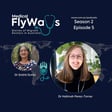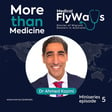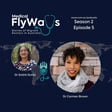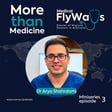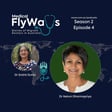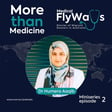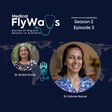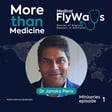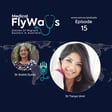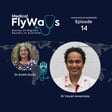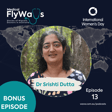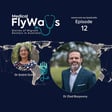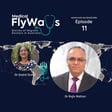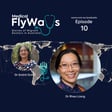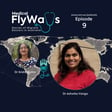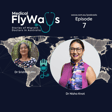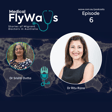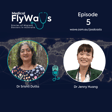Become a Creator today!Start creating today - Share your story with the world!
Start for free
00:00:00
00:00:01

More than Medicine - Episode 4: Dr Satbir Aulakh
A GP with special interests in anti-ageing, aesthetic and metabolic medicine, Dr Satbir Aulakh balances a high-demand medical career with writing and producing his own music in his native Punjabi language. Based in Darwin, Dr Aulakh's music has achieved millions of views on YouTube, and he's developed a cult international following.
Hear how this classically trained singer finds solace in song while working at multiple medical clinics in the top end.
Recommended
Transcript
Introduction to 'Medical Flyways' Featuring Dr. Sadbir Olak
00:00:01
Speaker
Medical Flyways, the untold journeys of migrant doctors in Australia.
00:00:13
Speaker
Hello everyone, welcome to another episode of Medical Flyways and I am incredibly lucky to have with me today Dr. Sadbir Olak. He is a GP in the Northern Territory and is also a practice owner and most importantly is a ah musician and performer and would ideally like to be more a musician and performer than a doctor is what I have gleaned from an ABC article about him.
00:00:41
Speaker
Welcome, Sadbir. And is there anything else you would like to share with us as part of the introduction? Thank you, Srishti, for having me on Medical Flyways podcast. na I think you've summed it pretty well.
00:00:55
Speaker
And I've been looking forward to talking to you since we first made a contact by an email that you sent me. So and I'm very happy and thank you again.
From India to Australia: Dr. Olak's Journey
00:01:06
Speaker
Awesome.
00:01:06
Speaker
Now, I know that I should say that when we were considering the miniseries where we talk to GPs who've contributed in ways other than medicine to the culture and community that they belong to, one of the things that stood out for me when I read the ABC article was your involvement with the community that you're part of.
00:01:28
Speaker
So going back to the thing we often talk about is people's journey. How did you end up being where you are? It just happens. You just end up where you always wanted to be.
00:01:39
Speaker
Growing up in India, always wanted to... be a doctor because my dad was a doctor. And then I ended up studying medicine in Assam. Then for a brief while, ended up in the UK.
00:01:52
Speaker
And it was just after the EU had formed. And people with non-EU passports were finding really hard getting jobs. That was 2004, early 2004.
00:02:03
Speaker
After a few observership roles, I realized it's going to be very hard next few years. And it was by fluke that I came across an ad And those days, you know, we didn't have phones. You have to and get into a cyber cafe or somewhere.
00:02:19
Speaker
And I remember there was a hospital in Mount Gambier looking for doctors. um So I just applied for it and they had a phone interview. And i didn't when I applied, i didn't know Mount Gambier was in Australia.
00:02:31
Speaker
I thought it was somewhere in the UK. turns out that it's in South Australia and they would like to interview me at 9 p.m. and GMT. I said, oh yeah, that would be right. And then I ended up in Mount Gambier. So I was very happy to be leaving and the gray skies in London and ending up in sunny Australia. But little did I know that Mount Gambier was a bit colder than London with no sun at all. And it was always drizzling.
00:02:58
Speaker
But I spent two and a half years there, met my wife, got married. So yeah, I've got good memories of Mount Gambier. Always wanted to be a GP. And um by that time, i had had enough with the cold weather.
00:03:11
Speaker
So yeah, I wanted to go to the tropics and I wanted to enjoy the Australian sun. And that's how I ended up in Northern Territory. And then just you know doing general practice and I had a passion for longevity, anti-aging.
Balancing Medicine and Passion
00:03:24
Speaker
I've started working in that field as well. So I'm blending the GP work, skin cancer and some regenerative work currently. And I'm quite happy at this ah this moment.
00:03:36
Speaker
And music has always been part of what I did. I realized that I need to do something with music. so i mean every now and then I've been releasing some songs. originals, covers and that goes on.
00:03:50
Speaker
So in terms of your journey, I mean, fascinating that, so I was, I got went to UK at the in mid to end of 2004. So we definitely can relate to the experience. And I'm sure that when you say London, you mean one of the eastern suburbs.
00:04:08
Speaker
And incredibly, we used to have a queue of people at the post office there posting job applications or applications for observership. I think the postier knew very well who would be the people there every Monday morning. So its it is fascinating how our journeys often are similar yet different as well.
00:04:29
Speaker
I have memories of that too, shall I say. But I was a bit lucky to have gotten bailed out of it. Most of my colleagues who stayed back, and I'm sure you had similar experience, did find jobs. And it was quite but wonderful being in London. But I bailed out quite early, so I didn't get much time there.
00:04:48
Speaker
Oh, well, I'm sure you had your own adventure, is how I would put it, so as all of us did. So at Mount Gambier, South Australia, semi-rural or rural for the audience? It would be semi-rural, yes.
00:05:01
Speaker
Was it a hospital job? You said you were you were in a hospital. What was that like to begin with? Because it would not have been anything like the UK. No. So I got thrown into the deep end where i was managing emergency department. so And I had done some consistency stints as an intern, but nothing more than that. And I just wanted to be a GP. was more curious being a GP, but there you go. I was in emergency and most of the work was pretty much like general practice. However, every now and then you've got serious emergencies coming your way.
00:05:35
Speaker
So that good exposure. i learned it on the on on the spot and there was some help with senior colleagues. So good learning, steep learning experience, which Were there other doctors that had joined the, you know, so for me, as a new trainee in the UK, there was almost always a cohort of other people that were either navigating with a similar timeline or occasionally there'd be people that had gone before you.
00:06:02
Speaker
Were there any networks, any connections that you had at that stage? Yeah. It was nothing like the UK. So Mount Gambier being is very small city, not on the radar of most IMGs or doctors coming from the UK. So we had very few doctors, and but there were some you know specialists who, your consultants who taught me a lot, very few doctors in my shoes, similar to what I was doing, but we learned it quite well.
00:06:31
Speaker
It was well supported, i would say. But luckily it was not a hardcore emergency scenario. It was more of a general practice slash emergency.
00:06:43
Speaker
I think that's fairly similar now as well, which is the is it ah like a GP-led emergency service with support from other clinicians as well. Yes. and And so you're I'm referring back to your earlier journey. Assam is a northeast Indian state, at one of the largest ones from memory. And ah when I have visited it, it's got this really interesting blend of a few, like ah obviously I'm talking about when I was in school. So this is a while back.
00:07:16
Speaker
There was this blend of, it's got a large nature reserve, national park, And then you've got the urban sprawl and then a very rural, ah ah most of geographically, most of it is rural.
00:07:30
Speaker
Was the medical college, was there any parallels between what you had in Mount Gambier and say the medical college in Assam? Were they similar in terms of what their catchment was and what presented Not really, because Assam was a bit similar to Darwin, I would say, very tropical.
00:07:47
Speaker
ah The presentations were quite tropical, a lot of lot of a mosquito, tropical diseases. Mount Gambier was obviously more had Western problems, so more chronic disorders, but yeah lot of accidents. So I had a little bit of exposure working in accident emergency as an intern.
00:08:09
Speaker
So that that came handy, but I hadn't had much external emergency experience prior to... Well, Mount Gambier taught me a lot, lot more. So there are some similarities, but not not as much.
00:08:21
Speaker
We've had a ah previous GP tell us about rural practice being quite interesting in terms of patients' expectations of a patient presenting with a fracture to their GP clinic.
00:08:33
Speaker
Is there anything that comes to mind that was a surprise or unusual for you to begin with? Yeah, well, come Saturday, there used to be so much so many injuries related to football that we started lot of plastering and a lot of back slabs and a lot of ordering x-rays and doing some clothes reductions. And so that was quite fascinating.
00:08:57
Speaker
And and yeah every Saturday we used to be ready for that. and And I think I recall my job in the UK, we used to always volunteer to do after hours work on the days when the big footy matches were on because no one was in no one was coming. They were all watching the football.
00:09:13
Speaker
So it was the next day that everybody turned up because there'd been a brawl afterward. Yes. a So do you feel that that was a good experience in terms of the acculturation process or, you know, the kind of getting to know the country and the place?
00:09:31
Speaker
Was that handy in moving to NT? And if you've lived in India and then you've lived in Australia, you understand the regional differences are still significant. When you moved, what else did you find was familiar or
Life in the Northern Territory
00:09:44
Speaker
different?
00:09:45
Speaker
Unlike India, as you know, where change miles you drive. The language, the culture, the script changes and people change. Australia is very homogenous. It's similar wherever you go. So it was a good introduction to the country, yes.
00:10:01
Speaker
Coming to Mount Gambier, getting used to the accent, to the culture was good. And people are very, very friendly, I must say. still have friends and we still stay in touch.
00:10:13
Speaker
and And mind it's been close to 20 years since I was at Mount Gambier. So I have fond memories and it was a good introduction to what lay ahead. And I've recently visited Darwin. I must admit, I didn't really get a chance to be a tourist. It was work-related.
00:10:31
Speaker
I must admit it felt in some strange ways like returning home. I'm not even sure what that means at this point of time. you know There's a culturally immersive feeling that that it is when you come to NT.
00:10:44
Speaker
Do you feel at home there now that you've been there for a while? Yes, it does feel home. It certainly does. And NT very different. As you said, there's no place in Australia like Darwin or Top End.
00:10:58
Speaker
very, very different from all other places in Australia. So unless you have been here, you won't know what it is. Obviously, the more you live here, the more you realize it's certainly different from any other place.
00:11:11
Speaker
You either like it or hate it. And if you hate it, you leave in two years. Obviously, I've been here close to 20 years. that right We know exactly how you feel about it. Yes.
00:11:23
Speaker
Does being there mean that you travel less to other parts of the country? I still have to travel a lot because, as you know, and and you know we are in a semi sort of, it's still not a big city. So to get all my, if I have to do any educational activities, have to go down south, as we say. Every every place is down south for us. So we have to travel a lot. And then wife and i we travel a lot, two, three, four times a year, international holidays. So Now, mean, luckily we do have an international airport, which is just four hours away from Singapore. So it's quite central that way.
00:12:00
Speaker
We don't have to come to the East Coast to travel anywhere. So in that way, it's quite central. I didn't realize it was only four hours from Singapore. There's a part of me that really wants to talk about the music because it is quite something to be able to still connect with the culture that you grew up in.
00:12:19
Speaker
So where did music fit into, you know, Sadbir's life as a young person or as a child? What was your introduction to it? Well, mum says that I used to sing even as a three-year-old.
00:12:33
Speaker
Obviously, I don't remember. I have my first memory of singing in like in in classrooms and and my teachers would encourage me sometimes, sometimes not.
00:12:44
Speaker
Classmates would ask me to sing songs. So I just used to sing in school, you know, just impromptu whenever they wanted me to. Didn't do any proper shows or was never selected to sing for community events or anything, but it always took a backseat.
00:13:03
Speaker
And then as you get into studies and to being a doctor is, you know, it gets very competitive. So music was always not a priority. So
The Musical Journey of Dr. Olak
00:13:14
Speaker
once I came to Darwin, I thought, right, I'm in but my mid-30s. I should be pursuing it a bit more seriously.
00:13:23
Speaker
I was lucky enough to to get in touch with certain music producers. I don't write my own music so i can because i never learned it. I do tend to collaborate with other artists, like-minded artists, and then then come up with a production.
00:13:41
Speaker
Luckily, I have done a fair few and I'm happy the way it's heading. And although sometimes I wish I could be a musician who works as a doctor part time or doctoring is a hobby, but that's more of tongue in cheek sort of expression.
00:13:58
Speaker
I certainly love being a doctor and I'm happy with the blend of doing a couple of Darwin Festival gigs here and there every year.
00:14:11
Speaker
So was that, yeah from what you're, and I have heard many versions of, you know, many reasons why people pick hobby or an interest or a passion rather outside of medicine.
00:14:22
Speaker
It sounds to me like it was this unfulfilled part of your journey. journey and you felt able to pursue it at at a certain point, do you feel it was, you know, contributing to your self-care or your wellbeing in any other way?
00:14:41
Speaker
Or if it didn't hit this screen, would it still have been enough? It's interesting you ask that. In my mid-30s, it was probably more to, there was a hunger for recognition and I thought, oh, you know, there's always a sense of comparison. I can be better than this artist or that one.
00:15:00
Speaker
That stage in my life, yes, it was was more for my ego probably. But at this stage, I don't want it to be heard just because I want to prove a point. I want just want to sing because I think I have to provide something to some audience somewhere.
00:15:20
Speaker
And then, you know, I don't care if I get popular or commercially successful. I do it because it makes you happy. And and it's more quite meditative in a way.
00:15:31
Speaker
When you're performing, you're in the moment and you're trying to convey a message, which some people get it. And, you know, I'm not no longer wanting any anything out of it. It's just the the process of going through delivering ah song gives me all I ever needed from it. Awesome.
00:15:54
Speaker
and And it's fascinating that when I, and you know, we had a little conversation about how the podcast came about and ah very much so that you do you need some sort of thought process or seed or whatever desire to start something new. But you're right in that action precedes clarity as my very wise mentor would tell me again and again.
00:16:16
Speaker
I have noticed that you stuck to a particular genre with your music, from my understanding. Is that a nostalgia, a longing for a place you've left behind or a time you've left behind or a strength or in a particular area of music?
00:16:32
Speaker
How did that happen? It has changed a tiny bit. I think I'm in more of an in-the-moment person, so whatever like I like in that particular moment, and I'll do it. There's no certain genre that I would like to pursue, or I don't like or dislike any any any genre per se.
00:16:50
Speaker
I go with with the heart.
Connecting with the Audience
00:16:52
Speaker
And if I don't like it, I won't. And it's very hard to say what I like. And when you look at what I've done in music, and if it sort of sounds like there's a genre because I do similar sort of songs. But that might be saying something about my background when I grew up, you know, as a child in the 80s.
00:17:11
Speaker
And that leaves an impression in your mind. And you tend to go back to that when you're choosing what you want to do. But certainly I'm open to all sorts of genres, but I tend to like songs from a certain genre.
00:17:27
Speaker
Although I have tried a little bit of hip hop version in a song that I did. It was called Bella Bella. It came in 2021. I haven't found any more producers coming up with similar songs that I like, so I haven't done it.
00:17:42
Speaker
but I'm open to anything. Lately, I've been doing a lot more Sufi music. Again, maybe because I've started practicing a bit of meditation. So that's something I relate to.
00:17:54
Speaker
It's probably more reflective of what you like at the time and or stage of life. Yes. Yeah. and And do you find the audience is varied depending on what you produce as well? Or how how does one, I mean, this is like an area that I have very little direct interaction with other than being a consumer of it.
00:18:13
Speaker
So I'm just intrigued by the process just as much as the product. Well, interestingly, these days, Spotify Artists app, it tells you exactly what sort of audience is there for your music.
00:18:25
Speaker
It'll tell you what part of the world, what age groups, what sort of interests do do they have, and they can tell you which way you're headed. My music, obviously, the consumers are mostly of the Indian or so Southeast Asian diaspora, not necessarily in India, but elsewhere.
00:18:43
Speaker
In fact, but most of my listeners are possibly of the of the Southeast Asian background, living outside of Southeast Asia. A lot of them are in West Greece, and I can see that. i don't know why.
00:18:56
Speaker
not the the native Indians, but Indians living outside of India. And maybe it's reflecting with people of my generation who have left at the same time and they are sort of trapped in that time space.
00:19:13
Speaker
It sounds interesting because i will tell you, it's ah it's a it's I think it's a part of being a migrant from any part of the world where your memory or recollection of the place you've left gets frozen in time.
00:19:26
Speaker
So, you know, for me, a fruit is still five rupees when it might already be 500. Yeah. you know So it's yeah it's fascinating. It's a subculture. Or as a friend of mine recently mentioned, third culture kids, which is, ah you know, so my children would be that group as well. And you're right, they do get exposed to mainly music that is non-contemporary when it's Hindi music or South Asian music, because it's what meme I might listen to or my husband might listen to.
00:19:58
Speaker
more so than the the more contemporaneous popular music in India. Yeah, true. And that has changed so much. I can't relate to it. Well, that's what I was going to ask you. Is there anything you listen to at the moment from the South Asian Awards produced in India? Is there any artists or any particular performers that you follow?
00:20:18
Speaker
Not really, no. I think there's lot of work being done around Nusrat's kawalis. And I mean, they were, we whilst we were growing up, we were hearing them.
00:20:28
Speaker
Not as much in the 80s because of the India-Pakistan rivalry. i think in the 90s or early 2000, the Pakistani artists were being heard in India.
00:20:40
Speaker
And I think I do go back and there's a lot of work being done around Nosrat's original work, which the Kivalis that he composed, probably the other best in the world.
00:20:52
Speaker
And a lot of producers are working around them after getting their legal rights sorted. So I do listen to those, but not much really in terms of new artists at the moment.
00:21:06
Speaker
Yes, and and what you you know you're you're referring Nusrat Fateh Ali Khan, who was a musician, composer, artist. I must admit, my exposure to that has been through Bollywood and his compositions that were in Bollywood, not to his original work.
00:21:23
Speaker
And yeah, that is very much Sufi-based music. And there is certainly more recognition of that outside of the South Asian subcontinent now. So if you had to, you know, we still know that there are a lot of doctors who come over to Australia from other countries.
Advice for Migrant Doctors
00:21:42
Speaker
If you had three top tips for them, what would they be? follow your heart. Don't make too many plans. Just live in the moment. You will find what you want to do.
00:21:54
Speaker
Shouldn't say work hard because you end up working hard anyway, but have some time for work-life balance as well. So it's not just work. You need a life balance. Yeah.
00:22:06
Speaker
That is an interesting point. and And so are you happy with your current balance or where you are at at the moment? Yes, yes. And I'm um i' very happy at the moment.
00:22:17
Speaker
I probably would like to do a little bit more music, which has been left behind lately due to um some unforeseen circumstances, but um I'm trying to get back this year. and do a video for after for a while.
00:22:30
Speaker
ah but I was talking to my video producer yesterday and we're trying to, I'm just sending him transcript where I'm translating the lyrics and then he's going to work on the story, visuals, and then we will go back.
00:22:47
Speaker
Sometime during mid-year, we'll do a video. And so in the next 10 years, we're going to see more of your music and less of you as a doctor is what I'm hearing. Or is it going to be a continuous juggle to balance that as well?
00:22:59
Speaker
I think that will continue to happen. as It's always going to be a balance of various things you want to do in this short lifetime. and There's a lot more to be done. Is there any possibility of music that you have done before with and any contemporary Australian music being blended or any collaborations in the line in the pipeline?
00:23:21
Speaker
I am always open to collaborations. Oh, well, there we go. So we put it out there. Yes, yes, let's put it out there. If anyone's listening, please get in touch with us.
00:23:33
Speaker
We'll be very happy to collaborating with any of those artists. And we normally tend to do, you know, kind of three words at the end. My thought is if you could give us three songs of yours, which you think we should listen to and might not have heard, I would really appreciate it because I'll go and have a listen to them. Right, yeah. So...
00:23:53
Speaker
um I was fortunate enough to sing alongside Radha Teli Khan in 2017. So the song is called Na Jaung. It's on T-Series and released 2017. I've always liked my song Bella Bella. It's released 2021.
00:24:10
Speaker
It's been released on my channel, Sapirolac Music. And the third one would be, latest one would be Sajna Teriyad that was released last year on Sadbir Oluf Music.
00:24:26
Speaker
Awesome. Well, that's given me the next three for my playlist and hopefully for the audience too. Thank you very much, Sadbir, for being with us today and for sharing so much of your journey. And while the podcast is the most creative that I have got, maybe I will dabble with other things too in the future.
00:24:46
Speaker
Thank you,
Expressions of Gratitude
00:24:47
Speaker
Sreshtia. You're doing an awesome job connecting doctors, IMGs like myself with the audience. And now thank you for having me. Really appreciate the way you do and conduct these podcasts. Thank you.
00:25:01
Speaker
At Medical Flyways, we're always on the lookout for inspiring stories from migrant doctors in Australia. If you have a colleague whose stories need to be told, head to wave.com.au slash podcasts.
00:25:16
Speaker
Medical Flyways is recorded on terrible land in Mienjin, Brisbane. This podcast focuses on overseas doctors and their families finding a home in Australia.
00:25:28
Speaker
We acknowledge and thank the traditional custodians of country throughout Australia and recognise the continuing connection to lands, waters and community.
00:25:40
Speaker
We pay our respects to Aboriginal and Torres Strait Islander cultures and to Elders past, present and emerging.
